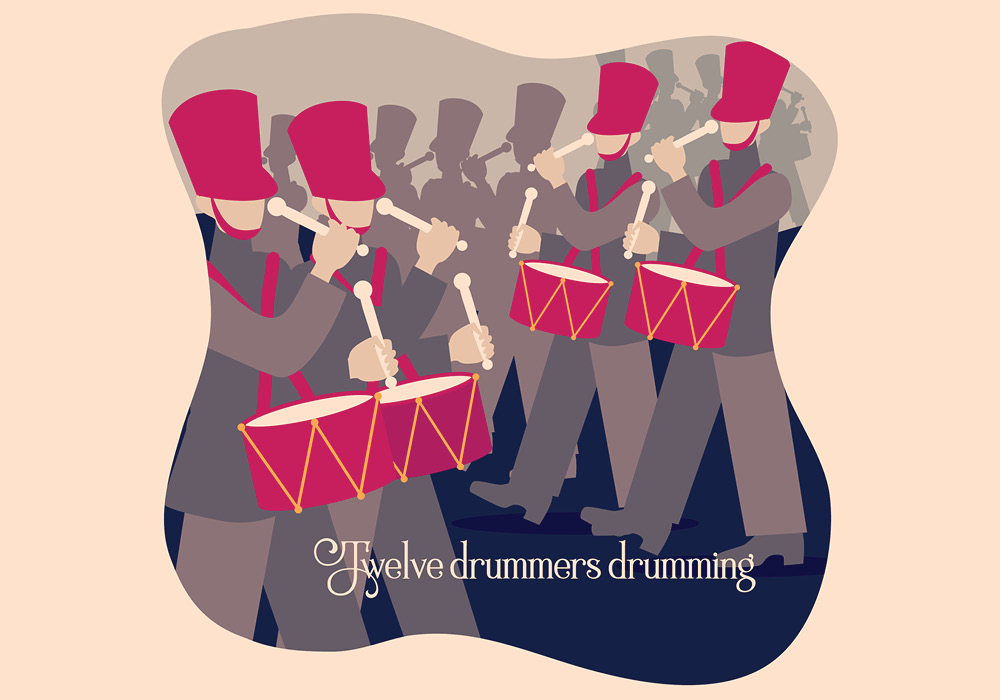partridge in a pear tree
The likelihood of finding a partridge in a pear tree is slim, and not just because partridges aren't big fruit eaters. Partridges are ground-nesting birds, preferring to avoid soaring journeys and high perches. The word ultimately comes to us from perdix, the Greek word for the bird. This word is thought to be based on a verb meaning "to break wind" ... apparently referring to the sound of the bird’s wings as it flies off.

two turtledoves

two turtledoves
In addition to a bird with a long, graduated tail and soft, cooing call, the word turtledove can refer to a sweetheart or beloved mate. The latter sense likely arose out of the bird's tendency to form strong, affectionate bonds in pairs, a trait that has been invoked in literature for centuries. William Shakespeare's 1601 poem "The Phoenix and the Turtle" alluded to this devotion in a tale of love between a phoenix and a turtledove. And oh, the turtle in turtledove? It has nothing to do with the shelled reptile. This turtle is based on the Latin turtur, imitative of the bird's distinctive call.
With two turtledoves and a partridge already in your pocket, three French hens might seem like the last thing you need. But, if your true love gives you three poulets de Bresse (Bresse chicken), a very esteemed French hen, then you should probably accept. The word hen develops from Old English hen(n), and is related to the Latin canere, "to sing," source of the English chant, among other words. Hen's must love a Christmas carol, then ...
four calling birds
Most of us sing this line as "calling birds," but in a 1780 version of this song, the line was "colly birds," likely referencing their color. Around the time this song was published, colly was used in British dialects to mean "dirtied, grimy, or coal black." Frederic Austin's 1909 version of "Twelve Days of Christmas" replaced colly with calling on the fourth day, and it stuck.
five golden rings
The word gold has been used for centuries to describe the valuable metal, and it derives all the way from an ancient (Proto-Indo-European) root meaning "to shine." This same roots also ultimately gives the word yellow.
In the song, this lyric was originally “gold rings,” rather than “golden rings.”
 six geese a-laying
six geese a-laying
Another day of Christmas, another flock of birds—or in this case a gaggle. Perhaps indicative of a fascination with the temperamental animal, the word goose has many colorful meanings. It can refer to "the female web-footed swimming bird," "a foolish person," or, um, "a poke between the buttocks to startle someone" ... not to mention the fun idiom wild-goose chase, which refers to "a wild or absurd search for something unattainable."
 seven swans a-swimming
seven swans a-swimming
Though your fowl capacity might be surpassed by now, there are still reasons to be grateful: at least this seventh-day gift is not seven swans a-singing, the result of which would surely classify as a swan song, a more ominous gift than anyone wants at Christmastime. The word swan is thought to literally mean "the singing bird," which would make it related to the Old English geswin, which means "melody, song," and swinsian, which means "to make melody."
 eight maids a-milking
eight maids a-milking
The milking done on the eighth day of Christmas is almost certainly done with the best intentions, but since this song’s appearance in the late 1700s, the verb milk has been used for a of range of actions, often exploitative or dishonest in nature. In cards, to milk the pack means "to shadily deal cards by pulling them from both the top and bottom of the deck"; to milk at the horse race was "to throw a horse race." In the late 1800s, milk also once meant “to bug a telephone.”
 nine ladies dancing
nine ladies dancing
The word lady comes to us from the Old English hlæfdige, thought to literally mean “loaf-kneader” or, more broadly, “wife of a lord.”
Entering English by 1300, the word dance comes from the Old French dancier. It supplanted the Old English word for dance, sealtian.
ten lords a-leaping
While lady is thought to come from the Old English for "loaf-kneader," the word lord comes from the Old English word hlafweard, which literally meant “loaf-keeper.”
The origins of lord and lady suggest a social structure where wives made the bread and husbands guarded it. Today, fortunately, anyone can be a household's breadwinner.
The word pipe, meaning “to play on a pipe,” can be traced back to the Latin pipare, meaning “to peep, chirp.”
This was the first of many verb senses that arose for the word, including “to make a shrill sound like a pipe,” “to lead or bring by playing on a pipe,” and, in baking, “to force dough or frosting through a pastry tube.”
twelve drummers drumming
The word drum is said to be a back formation of the longer word drumslade, alteration of the Dutch or Low German word trommelslag, which meant “drum beat.”
Pa-rum pum pum pum.






Комментариев нет:
Отправить комментарий